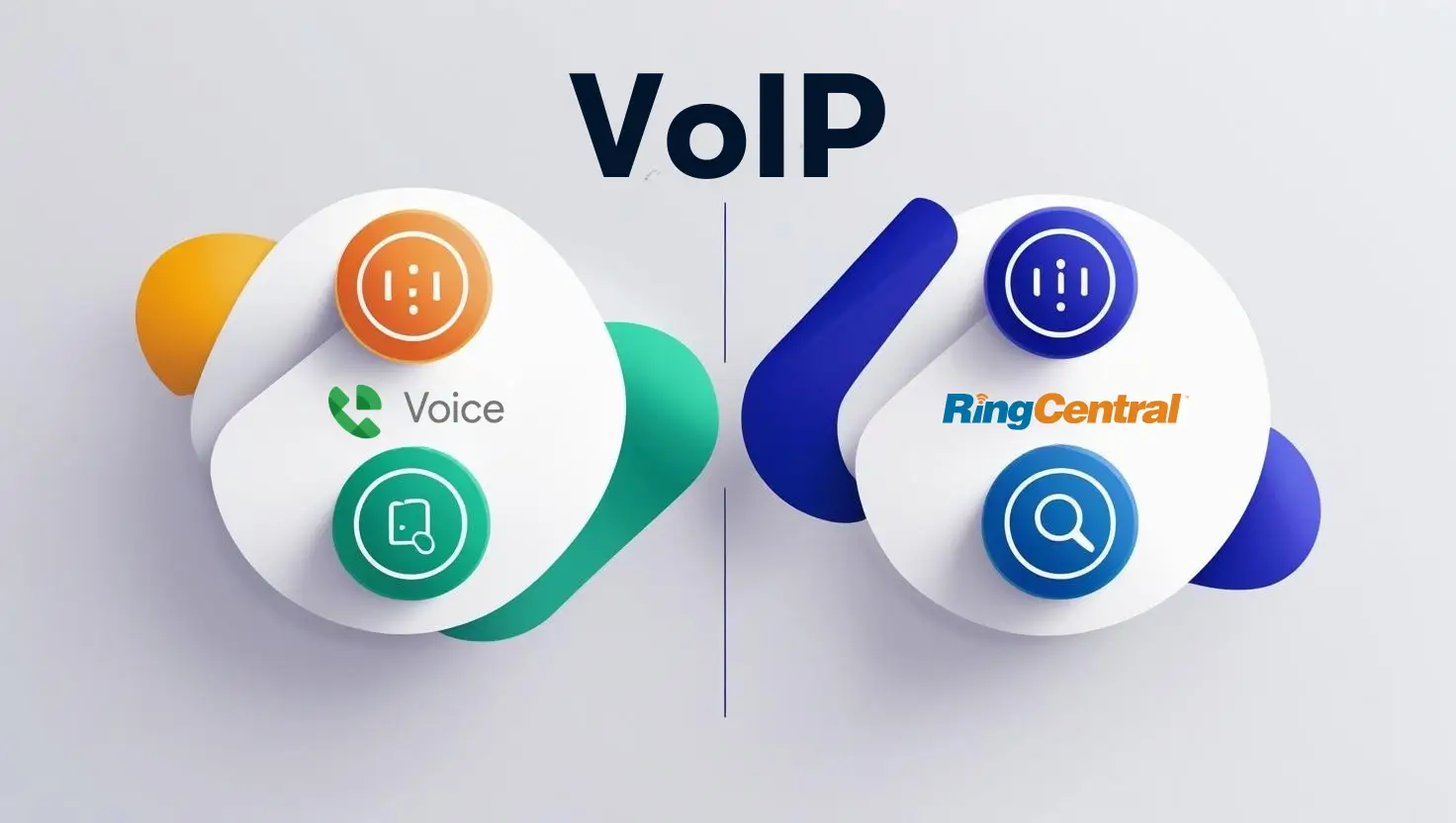Best Business Phone Systems for SMBs in 2025
Last updated: September 2025
A modern business phone system for an SMB is an essential tool for managing communications professionally and efficiently. Unlike traditional landlines, today's top solutions are cloud-based, using Voice over Internet Protocol (VoIP) technology to deliver powerful features at an affordable price. These systems are designed to help small businesses compete with larger companies by improving customer interactions, supporting remote teams, and scaling easily as the business grows.
- Try for free
- Cloud system with simple set-up
- Work from any device
- 30-day money back guarantee
- Making cloud communication easier
- All-in-one solution suitable to different industries
- Save as much as 50% on your costs
- Free phone number porting
- Unlimited US, Canada, Mexico & Puerto Rico calls
- 14-day free trial, Cancel anytime
- Unlimited calls & texts on any device
- Low-cost international calling
- 7-day free trial
- No hardware purchase required to setup
- Keep personal/business calls separate
- Flexible communications options
- Setup and switching is simple
- Mobile and desktop apps
- First month free
- World-class customer support
- Suitable for all business types and sizes
What is a Business Phone System for a Small Business?
A phone system for a small business is a communications solution that uses the internet (VoIP) to manage all inbound and outbound calls. It replaces traditional analog phone lines with a cloud-hosted platform, offering unified communications that integrate voice, video, messaging, and more.
For SMBs, this means access to enterprise-grade features without the high cost or complex hardware. Key capabilities include:
- Professional Call Management: Features like an auto-attendant and call routing present a polished image to customers.
- Unified Communications: A single platform for calls, video meetings, and team chat streamlines workflow.
- Remote & Hybrid Work: Employees can use the business phone number on any device (desk phone, computer, or mobile app), from anywhere with an internet connection.
How Much Does a Business Phone System Cost for an SMB?
The cost of a business phone system varies based on the number of users and the required features. Most providers offer tiered pricing, making it affordable for businesses of any size.
| Plan Tier | Average Price Range (per user/month) | Best For | Common Features Included |
| Basic / Essentials | $15 – $25 | Startups and very small teams with basic call needs. | Unlimited domestic calling, a business phone number, voicemail-to-email, and a mobile app. |
| Standard / Pro | $25 – $35 | Growing businesses that need more advanced features. | Everything in Basic, plus auto-attendant, video conferencing, call recording, and integrations (e.g., Google, Microsoft). |
| Advanced / Enterprise | $35 – $50+ | Businesses requiring analytics, CRM integrations, and call center tools. |
Everything in Standard, plus advanced call analytics, CRM integrations (Salesforce, Zendesk), and developer APIs. Export to Sheets |
Additional Costs to Consider:
- Hardware: IP desk phones can range from $50 to $500 per device, though many systems work with existing phones or through software on computers and mobiles (softphones).
- Setup/Porting Fees: Some providers may charge a one-time fee to set up the system or transfer your existing phone number.
Why You Can Trust the Expertise of Sonary
At Sonary, we are committed to providing accurate and trustworthy information to help you make informed decisions. Our research process is meticulous, transparent, and guided by a dedication to maintaining the highest standards of integrity.
Unlike many other review platforms, we conduct in-depth evaluations of the software and services we feature. Our expert team tests and actively uses the tools we review to understand their features, performance, and value comprehensively. Our assessments are based on real-world use, giving you insights beyond surface-level descriptions.
Our research methodology includes analyzing key consumer factors such as pricing, functionality, device usability, scalability, customer support quality, and unique industry-specific features.
This hands-on approach and dedication to transparency mean you can trust Sonary to deliver regular, up-to-date content and recommendations that are well-researched and genuinely helpful for your business needs.
Best VoIP Systems for SMB
1. RingCentral
A powerful and highly scalable market leader, RingCentral offers an extensive set of features and integrations. Its platform is exceptionally reliable and suitable for businesses of all sizes, from solo entrepreneurs to large enterprises.






Features
General Features
Devices
Calling
Advanced Calling
Pros & Cons
Pros
Cons
- Best for: Scalability and businesses that need robust features and seamless integrations with other software (like Salesforce, Google Workspace, and Microsoft 365).
- Key Features: Advanced Call Management, High-Quality Video Conferencing, Team Messaging & Collaboration, Extensive App Integrations (300+).
2. Nextiva
Nextiva is a unified communications platform that combines a robust phone system with video, team chat, and customer management tools. It’s known for its outstanding reliability and award-winning customer support.






Features
General Features
Devices
Calling
Advanced Calling
Pros & Cons
Pros
Cons
- Best for: Businesses seeking an all-in-one communication and customer engagement solution.
- Key Features: Unlimited Calling, Advanced Auto-Attendant, Call Analytics, Integrated CRM, HD Video Conferencing.
3. Ooma Office
Ooma Office is an affordable and user-friendly VoIP solution designed specifically for small businesses. It offers a straightforward setup and all the essential features an SMB needs to sound professional without a high price tag.






Features
General Features
Devices
Calling
Advanced Calling
Pros & Cons
Pros
Cons
- Best for: Budget-conscious startups and small businesses needing reliable, essential phone features.
- Key Features: Virtual Receptionist, Mobile App, Conference Calling, a Business Phone Number, and a Physical Desk Phone (included in some plans).
4. GoTo Connect
GoTo Connect is a dependable and feature-rich system that combines VoIP calling with the powerful GoTo Meeting video conferencing platform. It’s an excellent all-in-one solution for calls, meetings, and messaging.






Features
General Features
Devices
Calling
Advanced Calling
Pros & Cons
Pros
Cons
- Best for: Hybrid or remote teams that rely heavily on both phone calls and high-quality video meetings.
- Key Features: Cloud PBX Features, HD Video Conferencing, Advanced Call Routing, Visual Dial Plan Editor, International Calling Plans.
Side-by-Side Comparison






Core
Pros
- Rich selection of features
- Thorough integrations with other apps
- Easily manage international remote teams
Cons
- For larger implementations it can get expensive
- The number of features can be overwhelming






Core
Pros
- Always monitoring Call and network quality
- Paperless faxing
- HD video conferencing
Cons
- No deep integration
- Need very faster internet connection






Ooma Office
Pros
- Includes most telephony features customers need
- Cost is quite competitive
- Has a flexible configuration
Cons
- User reports of lower than expected call quality
- Backend navigation may not be as intuitive as required
Key Benefits of a Modern Phone System for Small Businesses
Upgrading to a VoIP business phone system offers tangible advantages that help SMBs operate more effectively.
- Significant Cost Reduction
Cloud-based phone systems eliminate the need for expensive on-premise hardware and maintenance. Bundled plans often include unlimited long-distance and international calling at a fraction of the cost of traditional carriers. - Enhanced Professional Image
Features like a professional greeting with an auto-attendant (virtual receptionist), custom hold music, and advanced call routing ensure callers have a seamless experience, making your small business sound like a large, established enterprise. - Scalability and Remote Work Flexibility
A VoIP system grows with you. Adding a new employee is as simple as adding a user to your online account. This flexibility is crucial for supporting remote and hybrid teams, allowing employees to stay connected using the business line from their mobile devices or laptops. - Powerful Communication Features
Access a suite of tools that improve productivity. Voicemail-to-email transcription, conference calling, and CRM integration automate tasks and provide valuable data to improve customer service.
Must-Have Features in a Phone System for Small Businesses
When comparing providers, focus on the features that will have the biggest impact on your daily operations.
Core Call Management
- Auto-Attendant: An automated receptionist that greets callers and directs them to the right person or department.
- Call Routing & Forwarding: Directs calls based on business hours, team availability, or caller ID.
- Voicemail-to-Email: Sends voicemail audio and transcriptions directly to your inbox for easy management.
- Call Queues: Places incoming callers in a line when all agents are busy, playing music or messages on hold.
- Mobile & Desktop Apps: Allows employees to make and receive business calls from their smartphones and computers.
Advanced Functionality
- CRM Integration: Connects your phone system with tools like Salesforce or HubSpot to automatically log calls and customer data.
- Call Analytics: Provides reports on call volume, wait times, and call duration to help you optimize staffing and performance.
- Video Conferencing: Integrated video meetings for team collaboration and client discussions.
- Business SMS/Texting: Enables sending and receiving text messages from your business phone number.
- Call Recording: Records calls for quality assurance, training, and compliance purposes.
How to Choose the Best Business Phone System for Your SMB
Selecting the right provider is a critical decision. Follow these steps to find the perfect fit.
- Assess Your Needs: Determine your budget, the number of users, and the “must-have” features your team requires. Consider your future growth plans.
- Compare Providers: Research top-rated business phone system providers that specialize in SMB solutions. Compare their pricing tiers and feature lists.
- Check for Reliability and Support: Look for providers with a guaranteed uptime of 99.9% or higher. Ensure they offer 24/7 customer support through phone, chat, or email.
- Request a Demo or Free Trial: Always test the service before committing. A free trial allows you to evaluate call quality, ease of use, and the functionality of the mobile and desktop apps.
Final Takeaway
For a small business, the right business phone system is a strategic investment that pays for itself through cost savings, improved productivity, and enhanced customer satisfaction. Modern VoIP solutions offer the power and flexibility needed to compete in today’s market. By evaluating your specific needs against the features and benefits outlined above, you can select a communication platform that empowers your team and drives business success.







